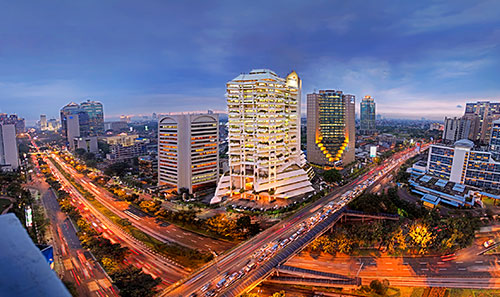Jakarta (30/10) – The national property developer, PT Intiland Development Tbk (Intiland;DILD) reported the Company’s financial performance for the period of January-September 2017. The consolidated financial report for the period ending on September 30, 2017 reveals that the Company garnered operating revenues of Rp1.7 trillion, an increase of 4.1 percent from what the Company booked in the same period in 2016, which was Rp1.66 trillion.
Intiland’s Executive Director of Capital and Investment, Archied Noto Pradono said the rise was due to revenue recognition in the industrial segment worth Rp551 billion. Sales from this segment contributed 31.9 percent of the total revenues.
“In the nine months into the year, the sales of industrial estate contributed quite significantly to the operating revenues. The rise notably comes from sales recognition of Ngoro Industrial Park by an automotive company in the second quarter of this year,” Archied explained.
Based on the segment, aside from industrial estate, another big contributor is the mixed-use and high-rise development, which contributed Rp490.8 billion, or 28.4 percent of the total revenue. The biggest contributor in this segment is 1Park Avenue apartment project in South Jakarta.
The residential estate segment books operating revenues of Rp339.3 billion, or contributing 19.6 percent of the total revenue. Serenia Hills residential estate project in South Jakarta became the biggest contributor in this segment with Rp232 billion.
The property investment segment which is the Company’s source of recurring income contributed Rp345.9 billion or 20 percent of the total revenues. The revenue from this sector jumped 38 percent from the achievement in the same period in 2016, which was Rp250.4 billion.
Archied said the jump in revenue from the property investment segment was due to the rise in revenue from office space rental. This segment contributed a total of Rp162.6 billion. Besides from office space rental, contribution came from rental of retail space and warehousing, and the management of sports club and golf course.
Based on the types of operating revenues, the development income contributed Rp1.4 trillion, or 80 percent of the total revenues. The reset came from recurring income segment with Rp345.9 billion, or around 20 percent.
Based on the profitability performance, Archied said Intiland reported gross profit of Rp705.9 billion and operating profit of Rp276.7 billion. The performance is relatively stable compared to the performance in the same period in 2016, which were Rp709.3 billion and Rp273 billion.
In the period of January-September, the Company booked net profit of Rp168 billion, which is 18 percent lower than the net profit booked in the same period last year, in which the Company recorded net profit of Rp205 billion.
“The decrease in net profit is due to the rise of loan interest expense for working capital required to complete the construction of our projects,” Archied explained.
Archied said in general the property market this year was not fully conducive. Even though there were indications that things were improving in the third quarter of the year, the market’s level of confidence hasn’t fully recovered, and customers still tend to wait and see.
The indicator showing the market is improving is the Company’s improved sales, notably in the third quarter of the year. In the period of January-September 2017, the Company garnered marketing sales worth Rp3 trillion, or increasing 115 percent from the same period in 2016. This achievement is 131 percent higher than the targeted Rp2.3 trillion set by the Company at the beginning of the year.
“We continue to monitor the movement in the property market. Our focus at present is marketing our current projects,” said Archied.
The management of Intiland hopes market confidence in the property sector would recover. The macroeconomic stability, the downward trend of interest rates, and regulations regarding the possession of property by expatriates/foreigners are expected to be the catalyst for the market to invest in the property sector.*
